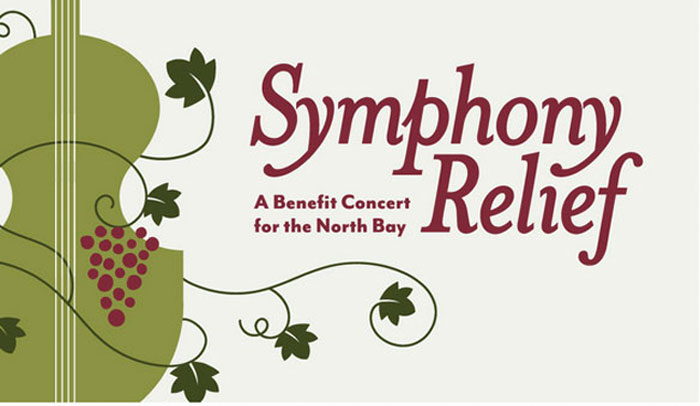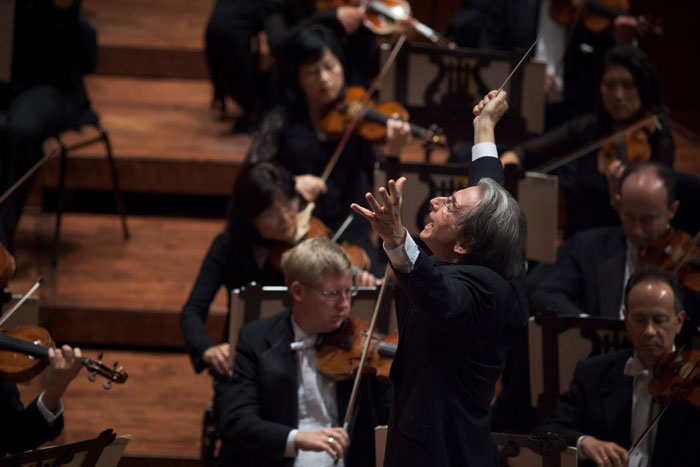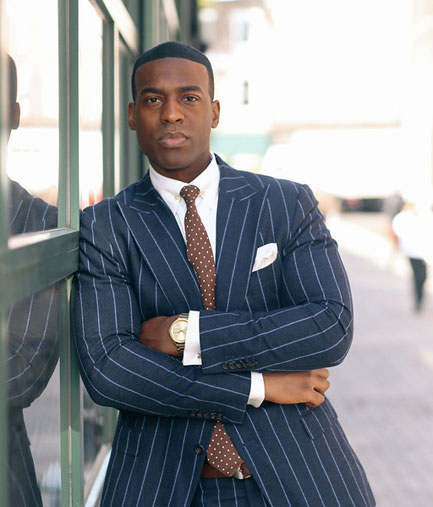
It comes as no surprise that Michael Tilson Thomas and the San Francisco Symphony have organized a concert to raise funds for those affected by the recent wildfires. In a magnificent gesture, MTT, the musicians of the Symphony, the San Francisco Symphony Chorus (Director Ragnar Bohlin), members of the San Francisco Opera Chorus (Director Ian Robertson), guest soloists – soprano Nikki Einfeld, mezzo-soprano Renée Rapier, tenor Nicholas Phan and bass Soloman Howard – as well as the SFS stage crew, ushers and staff, are all donating their services to present Symphony Relief: A Benefit Concert for the North Bay. The proceeds of this performance will benefit victims of the Northern California wildfires, through the North Bay Fire Relief Fund and the Sonoma County Resilience Fund.
The program – a blend of inspiring and uplifting music – opens with two very American works by Aaron Copland. Copland’s style of music has always been closely identified with this country – and his Fanfare for the Common Man is no exception. It was commissioned by Eugene Goosens for the Cincinnati Symphony Orchestra – initially to engender a spirit of patriotism during World War II. Copland gave the work its title, which turned out to be wholly appropriate since Goosens decided to premiere it on March 12, 1943 – three days prior to the one on which income taxes were due to be paid that year, and both he and Copland decided that this would be a good way in which to honor “the common man”.

The second work by Copland is no less American in both concept and style. It was written for the 1940 Sam Wood film Our Town, based on Thornton Wilder’s Pulitzer Prize-winning 1938 stage play about the ordinary, day to day lives of the people of a fictional town, Grover’s Corners, which was inspired by the town of Peterborough, New Hampshire, where Wilder spent many summers. With war looming on the horizon, the simple values of Our Town (set in the period 1901 to 1913) were viewed as comforting and appealing. As Copland said: “I tried for clean and clear sounds and in general used straight-forward harmonies and rhythms that would project the serenity and sense of security of the story”.
The finale from Tchaikovsky’s Symphony No 4 follows. It’s a work of high drama and gentle, lyrical passages, which, according to Encyclopaedia Britannica, Tchaikovsky considered to be “ultimately a characterization of the nature of fate”. Tchaikovsky wrote his Fourth Symphony in 1877, a rather turbulent year in his life. It was the year which marked the beginning of his involvement with Nadezhda von Meck, a wealthy widow who became his patron on condition that they should never meet. It was also the year in which he embarked on a short-lived and disastrous marriage which precipitated a nervous breakdown, but he returned to the symphony later in the year, dedicating it to his patron with the inscription: “Never yet has any of my orchestral works cost me so much labour, but I’ve never yet felt such love for any of my things.…Perhaps I’m mistaken, but it seems to me that this symphony is better than anything I’ve done so far”.

Also on the program is a selection of a cappella spirituals – performed by bass Soloman Howard who recently graduated from Washington National Opera’s Domingo-Cafritz Young Artist Program. Currently appearing as Timur in San Francisco Opera’s production of Turandot, Mr Howard lists among highlights of his career appearances as the King in Aida for Metropolitan Opera, Dr Grenvil in La Traviata for Los Angeles Opera and appearances for Washington National Opera as Fafner in Das Rheingold, Siegfried in Der Ring des Nibelungen, Sarastro in The Magic Flute, and Joe in Show Boat. He has attracted praise from The New York Times which describes his voice as “sonorous”, and The Guardian hailed as “a triumph” his appearance as Martin Luther King Jr in the world premiere of the revised edition of Philip Glass’ Appomattox.
For the final work in Sunday’s program the guest soloists join the Symphony, the San Francisco Symphony Chorus and members of the San Francisco Opera Chorus in the rousing fourth movement of Beethoven’s Symphony No 9, his much-loved setting of Friedrich Schiller’s Ode To Joy.
San Francisco Symphony violinist Melissa Kleinbart says: “We hope to use the power of music as a call to action that will inspire music lovers throughout the Bay Area to join us in raising much needed funds for individuals and communities who have been adversely affected by this catastrophic event”.
Michael Tilson Thomas leads the San Francisco Symphony, the San Francisco Symphony Chorus, members of the San Francisco Opera Chorus, and guest soloists, in Symphony Relief – a Benefit Concert for the North Bay, at Davies Symphony Hall on Sunday evening, November 19. For more information and tickets, visit the San Francisco Symphony website.
Sources of information:
Fanfare for the Common Man:
San Francisco Symphony program notes
Our Town:
Tchaikovsky Symphony No 4:
San Francisco Symphony program notes
Artist’s website – Soloman Howard
